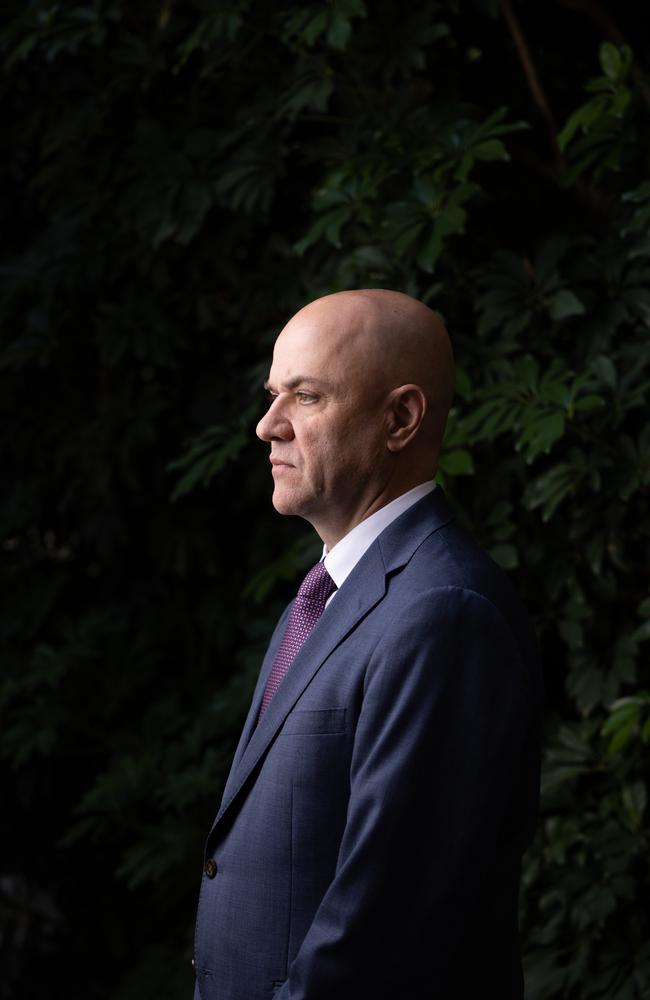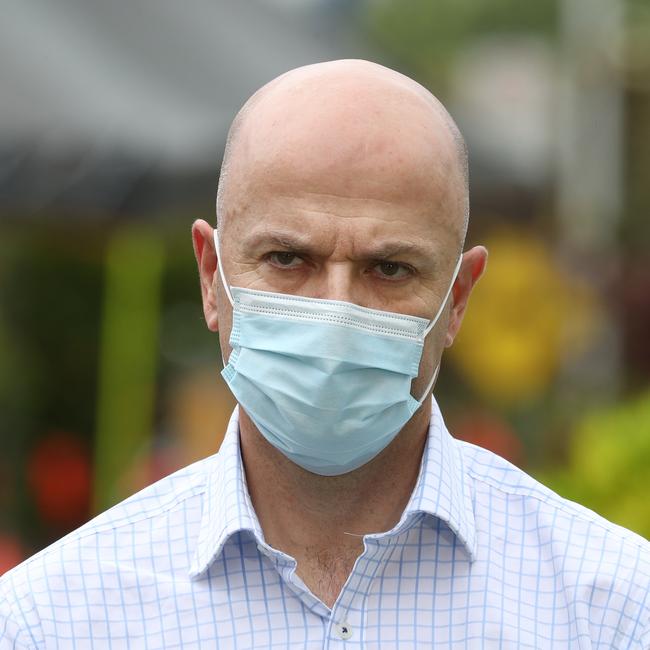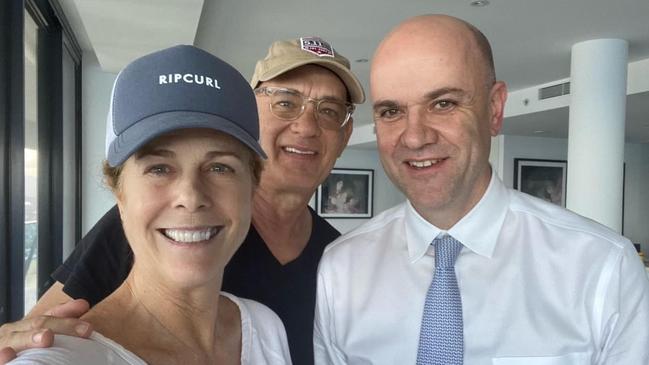It’s a secret passion that’s a “bit nerdy’’.
A fascination with the historic French military commander, Napoleon Bonaparte, makes Queensland’s chief health officer Dr John Gerrard go all fanboy: “This is one of the greatest, most inspiring, amazing men in the history of the planet.”
And illuminates a space where, just for the briefest time, all things pertaining to Covid-19 and public health threats can stand to one side.
A self-confessed Francophile, spellbound with French history and language, Gerrard usually finds himself talking about high fevers and crippling body aches, fatigue and other persistent medical symptoms, just about everywhere he goes. Experiences of Covid-19 are enthusiastically relayed to him at the supermarket, in lifts, at weddings or birthday parties, whether he’s on the clock, or not.
Gerrard has been consumed by all things Covid-19 in his tenure in the position since December 2021. It is his job to discuss it, answer questions, to be on call, and be Queensland’s trusted face of public health advice.

But surely, sometimes, he gets just a little bit tired of talking about it?
Gerrard, often simply referred to as the CHO, is in his Charlotte St office in Brisbane’s CBD, the home of the Queensland Department of Health and location of the State Health Emergency Co-ordination Centre that was mobilised during the pandemic emergency.
With a hearty laugh, he says: “I actually don’t get sick of talking about Covid. I’m probably the only person in Australia who doesn’t. People tell me all the time about their personal experience with Covid-19. But I really don’t mind at all.”

“Looking at numbers on a page is important but learning from individuals gives you a deeper understanding of the evolution of this new disease.”
As an infectious diseases expert, Gerrard has been planning for a pandemic since the 1990s, and was involved in making Australia’s first national pandemic plan in 1999.
For the biggest infectious diseases event and (hopefully) once-in-a-generation pandemic to then occur during his working life, was something of a professional jackpot.
It is important, of course, to get the language right about a sobering global event that World Health Organisation figures show has infected an estimated 776 million people, and killed more than seven million.
“Professionally, obviously, it’s like, you train for something, you study something your entire life, even if it’s a disaster … is exciting the right word? I guess it kind of is,’’ Gerrard says. “But we did very well, of course. And if we hadn’t, then we wouldn’t be having this conversation.’’
Gerrard was appointed CHO on December 13, 2021, the same day Queensland’s state borders were finally opened, ending the era of suppression and vaccination that was the hallmark of his predecessor Dr Jeannette Young. It was also his 60th birthday.

The world is now past the emergency phase of the pandemic, but not quite at a post-pandemic point, as the virus has not yet settled into an endemic phase, or clear seasonal pattern.
Gerrard, now 62, last contracted Covid-19 in March, the second time he has had it.
For many people, Covid-19 has receded into the background of their lives, as little more than an annoyance, with booster shots now only recommended for those over the age of 65-70 (who do not develop “immune memory”), or those with immunosuppression conditions.
During “peacetime”, Gerrard and public health officials worldwide, are now putting their heads together to assess the new landscape, to determine what the legacy of Covid-19 will be. Looking ahead to the next pandemic, they are working out how best to deal with a seasoned public, with people more sophisticated about what a pandemic is and means, and who hold a strong range of opinions ranging from do more, to do less.
The current public health mantra, Gerrard says, is that a different future approach is needed, with the focus shifting from persuading to informing.
“The way we messaged was probably wrong,” Gerrard says.

“When I say we, I mean the world. In the future, people like me in public health should focus on informing rather than persuading. You’re trying to give information for people to make their own decisions.”
This is the strategy, also, for how to combat “vaccine fatigue” – the “$64,000 question” for public health figures globally.
Gerrard says research shows broad generic messages are not as effective as those targeting specific groups.
“We need to get a more targeted approach to our messaging,” he says.
“So me standing up and saying, ‘Everyone get the flu vaccine’, they tell me, is completely useless, which is kind of demoralising. It’s useful insofar as we tell people it’s available. We’re still going to do that, even though they tell me it’s useless. It’s bad for my ego, but I still do it.”
Mandates, Gerrard admits, would also be difficult in the future, though he doesn’t rule them out.
“I don’t want to say you won’t have mandates for anything, I’m not going to say that.
“But the general move is away from doing anything on a mandatory basis. And my own personal philosophy is that mandates do make me feel uncomfortable. I don’t want to say never. I mean, it depends on the virus, of course.

“So is it going to be easier or harder next time? I don’t know. I’ve had these discussions with Kerry Chant (NSW CHO). I thought it would be easier because people get it. But they are also more opinionated.
“I mean, it’s like everything in the modern era. The population is polarised on everything.”
And don’t think we are done with pandemics.
There is a good chance, Gerrard says, of another global influenza pandemic in our lifetime, with the last major event the 1968 Hong Kong flu (not counting the “much lesser, very mild” H1N1 swine flu pandemic in 2009). The Hong Kong flu – that tragically claimed the life of Gerrard’s older brother Stephen, aged 11 in 1968 – was the third influenza pandemic of the 20th century, and that is now 56 years ago. In simple terms, humanity is due for another one.

This flu season is still being impacted by a “relative immune deficit”, a Covid-19 legacy of less exposure to all the usual bugs thanks to isolation rules and generally being more sheltered from normal person-to-person contact.
There have been higher case numbers of respiratory syncytial virus (RSV), whooping cough and flu circulating around with Covid-19, though Gerrard says the numbers, up by a couple of per cent, “aren’t that much worse”.
Next year, he expects a return to normal rates of respiratory infections. And Gerrard is practically bouncing with joy at the results of a new RSV vaccine, currently only available to all newborns in Queensland and West Australia.
RSV has been the most common reason why children under the age of one are admitted to hospital in the western world, but a new vaccine, introduced to Queensland on April 15 for all newborn babies, has had immediate impact.
On July 21, there was one infant aged under six months in hospital in Queensland with RSV, compared to the week prior to the vaccine rollout when there were 18 infants under six months hospitalised on average per day.
Gerrard says the vaccine has worked “like magic”. “The numbers are tiny now,” he says.
“It’s one of the most important stories in health for the past decade and no one’s noticed.”

Communicable diseases are the chief health officer’s “bread and butter” and Gerrard took on this job because of Covid-19. But it’s also his job to inform the health minister and, in turn, the public of other matters of public health significance.
Other public health challenges on his radar include nicotine vaping, and cannabis use by teenagers.
Psychiatrists have recently brought the issue of cannabis use by young people to Gerrard’s attention, with research showing a link between the more potent cannabis on the market today and the development of psychosis in teenagers, and increasing evidence it’s doing harm. He says he will be talking more about the issue later this year.
And in an area not typically in his wheelhouse, there is the harm of social media.
In May, Gerrard issued a “public health alert” over the steep rise in mental health issues coinciding with the emergence of social media and smartphones, likening increasing self-harm rates to a new virus epidemic.
Today, he says it is “the biggest public health threat of our times”.
“It’s a correlation, not a causation,” he says.
“Scientists will say we can’t prove that it is the definite cause. But something has radically changed in the lives of young people since about 2010. It’s hard to identify something that began in 2010 and that has progressed since then, other than smartphones and social media.
“I’m sure it’s affecting all of our brains. I don’t think there’s any question, but the brains of adolescents are particularly pliable. How important is this? I’m going to say it’s the biggest public health threat of our times.”
His comments come after his equivalent in the United States, the surgeon general, last year issued a public health alert about social media which made Gerrard think: “Okay, so maybe that is my job.”
“Mental health is not my thing, it’s not my specialty,” he says. “Clearly if there was an outbreak of the bubonic plague, that’s obviously my job, no one would question that.
“But when I saw the data on mental health and girls and social media, well, whose job is that? I feel quite strongly about this issue because I don’t know who else’s role it is. Whose job is it to tell the world, to formally inform the government that we have a problem, if it’s not mine?”

He says these latest public health concerns – vaping, cannabis and social media – “all threaten the psychological development of the brain development of teenagers”.
Covid, also, was not helpful.
“They are going to be the adults, they’re going to be running the country,” Gerrard says.
“Fortunately, Queensland wasn’t like most other states, but those lockdowns and school closures probably didn’t do them any favours. We asked a lot of young people during Covid for the sake of older people – people like me.
“My younger daughter’s university education was wrecked by Covid and I think that will have a lasting impact on her.”
Out of office, Gerrard’s fascination with French history and the French language was sparked when he attended years nine and 10 of his high schooling at the École Active Bilingue de Paris (the Active Bilingual School of Paris) while his father, a mechanical engineer, worked building the Australian Embassy, near the Eiffel Tower, in the city.

Gerrard and his wife Anthea, an assistant professor in law at Bond University, have two daughters, Catherine and Alexandra, who both also attended the same school in Paris for a year.
Catherine, 25, is an aerospace engineer, who has recently left the army and is now working for Rocket Lab, launching low Earth-orbit satellites from New Zealand.
Alexandra, 23, has finished a law degree and is now taking a gap year, living in Paris, working in a cafe in the city’s Latin Quarter and volunteering at the Olympics as a team leader at the aquatic events.
Gerrard is known, and perhaps recognised, by his wearing of Panama hats – he has two, a “more resilient” wet weather one and a “good one”.

When time permits, he enjoys his hobby of building model aeroplanes and indulges his interest in Napoleon.
“I’m a bit of a Napoleon fan, so I collect things to do with Napoleon. It’s a kind of a secret passion, and it’s a bit nerdy, but it is a thing,” he says.
“I have no aspirations to be a Napoleon, just to make that clear.”
Just don’t mention the 2023 Ridley Scott-directed film, Napoleon, starring Joaquin Phoenix in the titular role.
“It was terrible; appalling!” he exclaims.
“This is one of the greatest, most inspiring, amazing men in the history of the planet. No one has ever been able to make a successful movie about Napoleon, he’s just too big.’’
Gerrard hasn’t yet decided whether he will put his hand up to continue in the role of CHO after his three-year contract is up in December.
He has enjoyed the role but, equally, he also loves humanitarian mission work and would happily add to the three he has already done.

His first mission was a six-week posting to Sierra Leone in 2014 for an outbreak of the deadly haemorrhagic fever ebola, that he describes as “unbelievably frightening”, killing more than half the people who contracted it. Doctors were only allowed to serve a maximum six weeks because “if you started to lose your fear, it was dangerous”.
“In looking after patients with Covid, I was never afraid,” Gerrard says.
“Whereas, with ebola, if you weren’t afraid, you were at risk.’’
In February 2020, he travelled to Tokyo, Japan, to help diagnose the passengers and crew of the Diamond Princess cruise ship in a major Covid-19 outbreak; and in April 2021, he was on the Caribbean Island of Aruba answering an international call for assistance with its Covid-19 cases, while Queensland, protected by border closures, had none.

An unfortunate part of Gerrard’s job, common to all chief health officers, especially in the era of Covid-19, is receiving threats.
“We get pressured a lot, and we were during Covid, including, you know, threats of violence,” he says.
“I think all of us have had that at some point.
“It’s happened a few times to me. I can’t talk about exactly what they (other health officers) experienced but it was worse during the lockdown periods.
“People have walked up to me at restaurants and mostly they’re positive. But some people have been a little bit threatening. It’s happened to all of us, it’s the job.”

But this behaviour, though unsettling, is not what most upsets Gerrard. He is more disturbed when someone questions his understanding or knowledge as CHO.
He would like his legacy to be, simply, that he has been a credible source of information. His comments were most recently questioned in March when he said research showed post-viral symptoms were no more likely to occur after Covid-19 than other respiratory viruses and that it was time to stop using the term “long Covid”.
He stands firmly by his comments, stressing he does not question the validity of post-Covid-19 symptoms, just that they are not unique or exceptional to Covid-19.
He is also only talking about Covid-19 post-vaccination and post-Omicron variant.
“I spend a great deal of time researching what I say and I do not say things off the cuff,” he says.
“Everything is considered and it always aims to be measured.
“When my personal credentials or abilities are attacked, I take that very personally.
“I hope I have credibility. That, to me, is the most important thing. That is why I avoid minimising or exaggerating.”
He knows that, ultimately, people will make up their own minds, both on matters of Covid-19 and on the legacy he leaves as Queensland’s CHO.
But if he’s seen as a credible source of information and people are making decisions based on correct information, then, he says, no matter what they decide, “that’s okay”.
“It’s if they’re making decisions based on wrong information, that’s bad,” he says.
“That would be a failure.”
That would be his Waterloo.

Add your comment to this story
To join the conversation, please log in. Don't have an account? Register
Join the conversation, you are commenting as Logout
Bride reveals popular wedding tradition you should avoid
All it took was a small icon on his dating profile for her to swipe and meet the man who would become her husband years later.
Star musician’s horror dating fail: ‘It was a shocker’
An Aussie musician has opened up about her dating fail – and how it all worked out for the best.